Navigating the investing world can be daunting, especially if you don’t have much experience. With complex jargon, a vast history, and countless strategies to choose from, knowing where to begin can seem overwhelming. This is where the best investing books can lend a hand.
Written by professional investors throughout the ages, the 11 best investing books I’ve selected below distill lifetimes of experience into actionable insights that can transform your financial life. The list covers a comprehensive range of investing topics, from buying stocks and index funds to asset allocation and financial history.
So, whether you’re a beginner who’s just getting started or a seasoned investor seeking fresh perspectives, the books on this list are bound to give you a leg up in the financial world. Let’s dig in.
The Intelligent Asset Allocator by William Bernstein
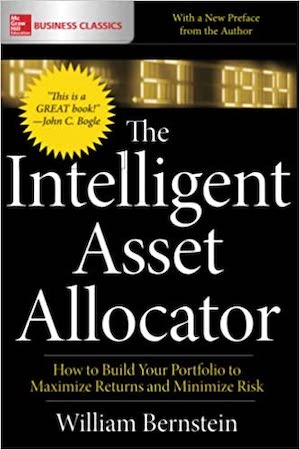
If you want to know which book made me fall in love with investing, then check out The Intelligent Asset Allocator by William Bernstein. While it can get technical at times, this book provides a comprehensive overview of asset allocation, detailing what assets you should own and in what proportions, and emphasizes its importance in shaping your portfolio. After reading this, you will have a deeper understanding of risk and return and be better prepared to construct a portfolio that works for you.
If you enjoy this book, I also recommend reading the work of David Swensen and The Ages of the Investor series by William Bernstein for more on the topic.
The Millionaire Fastlane by MJ DeMarco

Do you want to build a lot of wealth, but don’t have decades to compound your money? Then The Millionaire Fastlane by MJ DeMarco is the book for you. DeMarco’s main argument is that most people who build extreme wealth do it relatively quickly (i.e. in 5-10 years) and not by investing in public securities (i.e. stocks, bonds, etc.). He’s right, but there’s a catch—you have to start (and eventually sell) a successful business to do so. While not for most people, I find DeMarco’s argument compelling for those that want to take more risk trying their luck in the financial fastlane.
The Psychology of Money by Morgan Housel
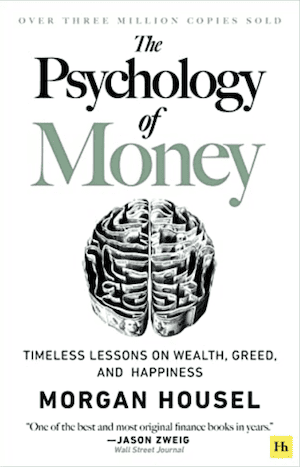
The first time I read Morgan Housel I was blown away. So when he decided to release his first book, The Psychology of Money, I knew it would become an instant classic. Thankfully, I was right. The book is comprised of 18 easy-to-read chapters that are insightful, entertaining, and thought-provoking. If you are a fan of great stories and want to re-imagine how you think about money, this is the book for you.
For those that’ve already read the The Psychology of Money, you may also like What I Learned Losing a Million Dollars by Jim Paul & Brendan Moynihan for another view on the psychology of investing.
Your Money or Your Life by Vicki Robin (& Joe Dominguez)
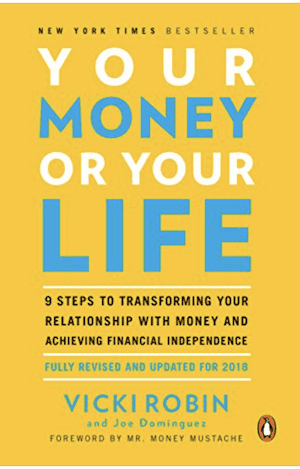
I was never a big fan of thinking about financial independence until I read Your Money or Your Life by Vicki Robin. In the book, Robin presents a new way of thinking about financial freedom and how you can use it to transform your life. I particularly enjoyed Robin’s idea of a “Crossover Point”—or the point where the income from your assets becomes large enough to fully fund your lifestyle—and how she sees money as something we trade our “life energy” for.
If you like the ideas presented by Robin, you may also enjoy Die with Zero by Bill Perkins, which argues that you should aim to maximize your life experiences by spending all of your net worth during your lifetime.
The Intelligent Investor by Benjamin Graham
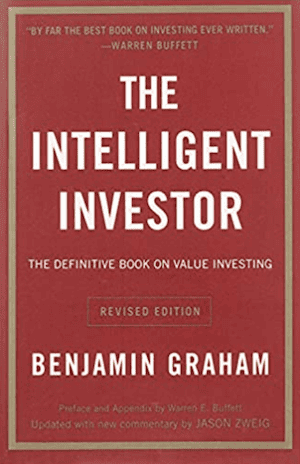
![]() No list of best investment books is complete without The Intelligent Investor by Benjamin Graham. Though the investment world has changed considerably since Graham’s time, reading the foundational work on value investing is essential to the future of any would-be stock picker. Graham’s ability to separate the act of investment from the act of speculation is one that will stand the test of time.
No list of best investment books is complete without The Intelligent Investor by Benjamin Graham. Though the investment world has changed considerably since Graham’s time, reading the foundational work on value investing is essential to the future of any would-be stock picker. Graham’s ability to separate the act of investment from the act of speculation is one that will stand the test of time.
If you found this work helpful, I’d recommend reading Security Analysis by Graham and David Dodd for a more technical review of the topic.
The Essays of Warren Buffett by Lawrence A. Cunningham
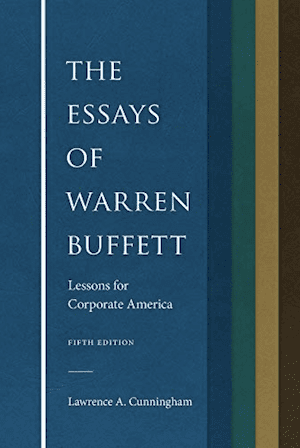
![]() If you want the insights of Warren Buffett without reading every one of his Berkshire Hathaway letters to shareholders, then The Essays of Warren Buffett is the book for you. Packed with decades of wit and wisdom from the world’s most famous investor, this collection makes the Oracle of Omaha accessible to everyone. I particularly enjoyed the structure of the book, which organized Buffett’s writings on everything from accounting to valuation.
If you want the insights of Warren Buffett without reading every one of his Berkshire Hathaway letters to shareholders, then The Essays of Warren Buffett is the book for you. Packed with decades of wit and wisdom from the world’s most famous investor, this collection makes the Oracle of Omaha accessible to everyone. I particularly enjoyed the structure of the book, which organized Buffett’s writings on everything from accounting to valuation.
If you’d rather learn about the life of Warren Buffett (which is a bit more entertaining), then I’d highly recommend reading The Snowball by Alice Schroeder instead.
The Most Important Thing by Howard Marks
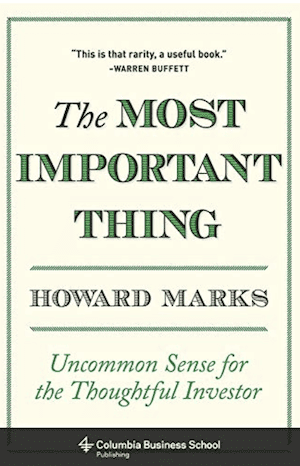
There are few investors that can match the intelligence and communication skills of Warren Buffett, but Howard Marks is one of them. Thankfully, Marks published a book called The Most Important Thing, where he lays out his investment philosophy through 20 timeless principles. My favorite part of the book is where Marks illustrates the concept of risk with a story:
I tell my father’s story of the gambler who lost regularly. One day he hears about a race with only one horse in it, so he bet the rent money. Halfway around the track, the horse jumped over the fence and ran away.
If the concepts of risk and uncertainty are fascinating to you, I’d also recommend:
- Fooled by Randomness by Nassim Taleb
- A Man for All Markets by Ed Thorp
- Against the Gods by Peter L. Bernstein.
Wealth, War & Wisdom by Barton Biggs
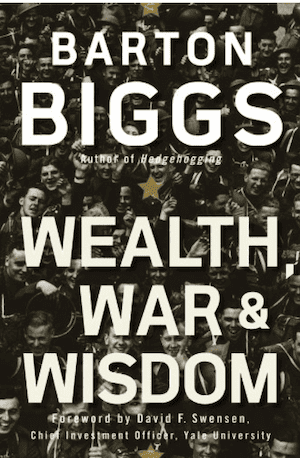
![]() If you like WWII history and you like the stock market, then you’ll love Wealth, War & Wisdom by Barton Biggs. Biggs does a great job of illustrating how quickly global stock markets priced in new information during the war while also dispensing investment advice along the way. My favorite part of the book is the conclusion where Biggs discusses how you should invest if you want your wealth to survive throughout the ages. Though this book isn’t as popular as many others on this list, it will be one that stands the test of time.
If you like WWII history and you like the stock market, then you’ll love Wealth, War & Wisdom by Barton Biggs. Biggs does a great job of illustrating how quickly global stock markets priced in new information during the war while also dispensing investment advice along the way. My favorite part of the book is the conclusion where Biggs discusses how you should invest if you want your wealth to survive throughout the ages. Though this book isn’t as popular as many others on this list, it will be one that stands the test of time.
The Great Depression: A Diary by Benjamin Roth
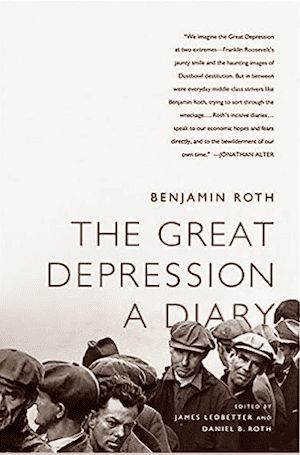
![]() Have you ever wondered what it was actually like to live during the Great Depression? In The Great Depression: A Diary, Benjamin Roth provides the answer. This fantastic work is a primary source material to one of the darkest times in American economic history. What’s more interesting is that Roth provides a first hand account on what was happening in the stock market as the Depression deepened. If you want definitive proof that the stock market is not the economy, read this.
Have you ever wondered what it was actually like to live during the Great Depression? In The Great Depression: A Diary, Benjamin Roth provides the answer. This fantastic work is a primary source material to one of the darkest times in American economic history. What’s more interesting is that Roth provides a first hand account on what was happening in the stock market as the Depression deepened. If you want definitive proof that the stock market is not the economy, read this.
The Money Game by Adam Smith (pseudonym)
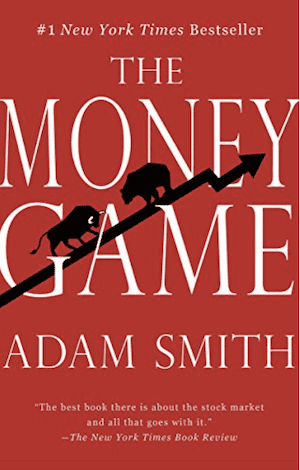
Despite being written under the pseudonym “Adam Smith”, there is nothing fake about the many investment lessons in The Money Game. Smith (aka George Goodman) writes about financial markets in a way that is uniquely informative and entertaining. While the material in this book is a bit dated, it also contains more timeless investment quotes than any book I’ve ever read. Trust me on this one and go pick up The Money Game.
A Random Walk Down Wall Street by Burton G. Malkiel
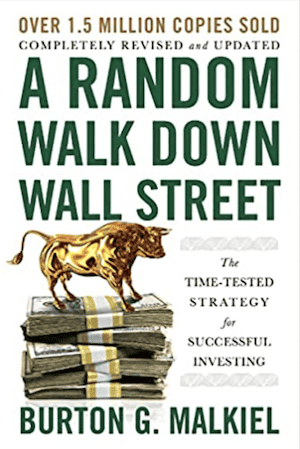
A Random Walk Down Wall Street helped to popularize the index fund revolution that took place over the past few decades. Though the message of the book might seem simple (i.e. most active managers can’t beat the market, so own the market instead), it was groundbreaking at the time. If you haven’t heard the argument for passive indexing (or haven’t heard it argued well), then A Random Walk Down Wall Street is the book for you.
For further reading on this topic, I’d recommend:
- The Little Book of Common Sense Investing by the late Jack Bogle
- Stocks for the Long Run by Jeremy J Siegel
- My own book, Just Keep Buying, which expands upon many of these ideas.
What’s Missing from the Best Investing Books?
Anytime someone creates a “best of” list, the difficulty lies is in figuring out what’s inside and what’s outside the category being examined. In the case of the best investing books, I had to exclude many great books that were simply not traditional self-help investing books.
For example, if you wanted to get started in personal finance, I would recommend Tiffany Aliche’s Get Good with Money or Ramit Sethi’s I Will Teach You to Be Rich. If you wanted to read an entertaining financial story, I’d tell you to pick up Liar’s Poker by Michael Lewis or Black Edge by Sheelah Kolhatkar. For those looking to learn more about trading stocks, I’d point you to One Up on Wall Street or Reminiscences of a Stock Operator.
All of these books (and many more) are great, but they are either too niche or not really in the investment category. For this reason, I had to exclude them from the list above. I say this because I always get questions like: “Why didn’t you include [X]?” and the answer is either: (1) It’s outside the category or (2) I haven’t read the book. Despite reading over 100 different books on investing since 2012, unfortunately, I haven’t read them all.
In the end, there is no “right” list of the best investing books. There are only those books that speak to you and those that don’t. I can only hope that the books I’ve compiled above help you in your financial journey as they helped me in mine.
With that being said, happy investing and thank you for reading!
If you liked this post, consider signing up for my newsletter.
This is post 208. Any code I have related to this post can be found here with the same numbering: https://github.com/nmaggiulli/of-dollars-and-data

